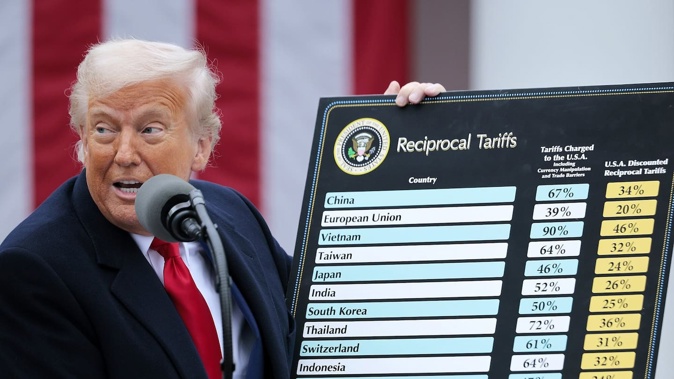
New Zealand share prices dropped sharply at the opening after overseas markets were aggressively sold down following US President Donald Trump’s announcement on tariffs last week.
After 30 minutes the S&P/NZX50 Index was down 300 points or 2.5% to 11,924, led by a fall in the market’s biggest stock Fisher and Paykel Healthcare, which dropped by almost $2 to $32.60.
As expected, China launched a tit-for-tat retaliation with a 34% duty on all US imports, thereby raising the odds of a full-blown trade war. Trump’s moves will take average US tariffs on Chinese goods to 76%.
Trillions of dollars have been wiped off the value of the US stock market in response to the tariffs as investors fear their inflationary impact, which may also stymie economic growth.
On Friday, Wall Street’s S&P 500 dropped 4.8% and the S&P 500 lost 6%.
The Europe-wide Stoxx 600 fell 5.1%, its biggest daily drop since 2020.
Britain’s FTSE 100 lost 5% and Germany’s Dax closed 4.7% lower.
“I think we we’ll definitely have a rough day today because that was a very rough day in the US,” Craigs Investment Partners’ investment director Mark Lister said.
“We will experience some of that weakness as we play catch-up, although we certainly won’t be down 6%,” he said.
Oil prices dropped on fears of a global economic slowdown, with Brent crude down 6.9% at US$65.33 a barrel.
In a flight to safety, investors swept into US Treasuries, pushing the 10-year yield down 0.13 percentage points on the day to 3.93%.
Last week, US Fed Chairman Jerome Powell hinted at a more hawkish outlook on inflation and rates.
Powell noted the tariffs announced last week were “significantly larger than expected”, and their inflation impact “could be more persistent”.
Lister said the impact of volatility on world markets might not be felt as acutely “because as a nation, we are not in the firing line”.
“We’ve got a string of interest rate cuts to come, which is positive, one starting on Wednesday,” he said.
A weakening New Zealand dollar will also provide a boost for exporters.
“And many of our companies are domestic-facing, such as the real estate property trusts in the utilities sector - they’re not related to global trade or other parts of the world.
“So, we will hold up better than most, but we will still suffer, because of that negative sentiment.”
The good news domestically was that market expectations for the Reserve Bank’s official cash rate had dropped.
The market now expects the OCR, by the end of the year, to start with a “2″compared with previous expectations of 3.0 to 3.25%.
This Wednesday, the Reserve Bank is expected to cut its rate by 25 basis points to 3.5%.
The New Zealand dollar has lost ground since last week’s tariff announcement, trading this morning at US55.96c, down almost US2c.
BNZ said US55c remains a key support level “but a downward break is entirely plausible if a deep global downturn ensues”.
“Of some comfort, we believe that NZD/USD already looks very “cheap” and a case might be building that we are close to peak pessimism on tariffs,“ the bank said.
While Wall Street remained closed, US stock-index futures fell sharply in anticipation of more declines when physical trade resumes in the States this week.
Futures contracts tracking the blue-chip S&P 500 fell 3.8% and those for the tech-heavy Nasdaq 100 slid 4.6%.
Last week was the worst the US market has seen since the depths of the Covid-19 pandemic in 2020, with stocks losing US$5 trillion ($9 trillion) in value in total.
Jamie Gray is an Auckland-based journalist, covering the financial markets, the primary sector and energy. He joined the Herald in 2011.
Take your Radio, Podcasts and Music with you









